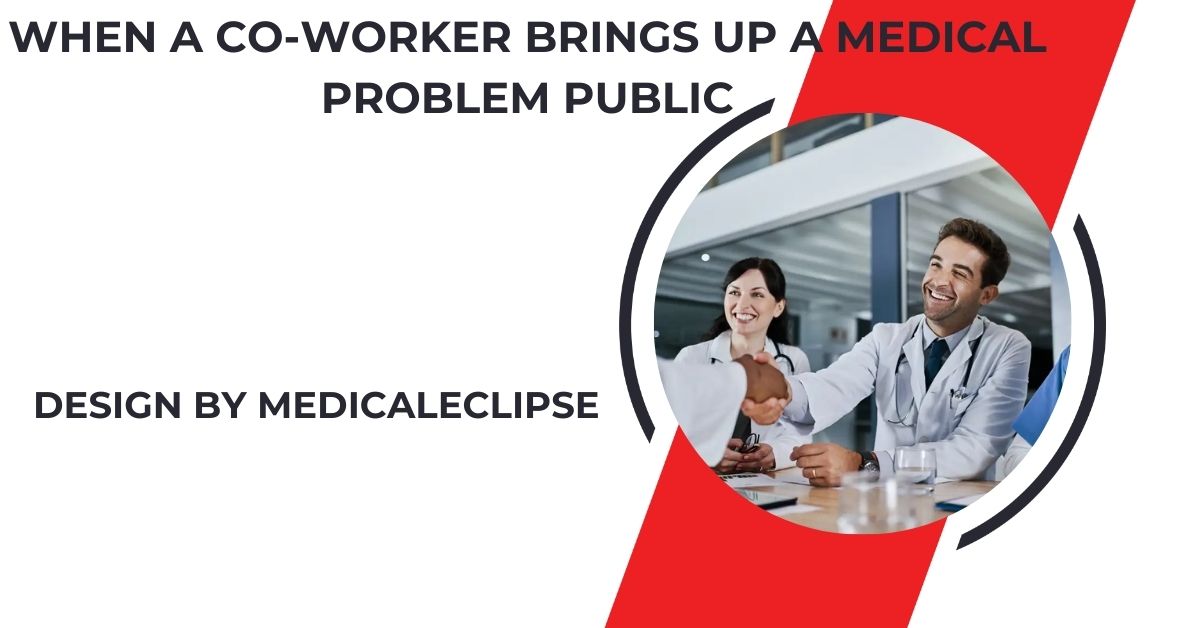When a co-worker discusses a medical issue in public, respond with empathy, briefly acknowledge their concern, and redirect the conversation to a more private setting.
This article provides strategies for dealing with these potentially awkward moments while ensuring you maintain respect and empathy for your colleague.
Why Do People Discuss Medical Problems in Public?

Before jumping into how to handle the situation, it’s important to consider why your co-worker might feel the need to discuss a medical issue in a public space. There are multiple explanations for this occurrence:
- Stress and Anxiety: Medical problems often create stress, and some people feel the need to share their concerns as a way of processing them.
- Lack of Awareness:Some individuals may be unaware that sharing personal health details in public settings can make others uncomfortable. This lack of awareness can lead to awkward situations in the workplace.
- Seeking Support:A co-worker discussing a medical issue may be seeking advice or emotional support. This need for connection often arises from stress or uncertainty about their health. Responding with empathy can make a meaningful difference.
- Workplace Culture: In some work environments, personal topics are frequently discussed, and the lines between professional and personal conversations can become blurred.
How to Respond When a Co-Worker Brings Up a Medical Problem Publicly?
When someone brings up a medical problem in a public setting at work, it can be challenging to know how to respond. Here are a few strategies to help you navigate this situation with tact:
Acknowledge Empathetically but Briefly:
It’s essential to acknowledge what the person is saying without dwelling on the topic. A simple, “I’m sorry to hear that” or “That sounds tough” can show empathy without encouraging a lengthy conversation. This way, you show that you care but maintain a professional boundary.
Also Read: Can I Qualify For Medicaid If I Have Retirement Accounts – Medicaid and Retirement Accounts!
Redirect the Conversation:
If you feel the conversation is becoming too personal for the public setting, gently steer the discussion back to work-related topics. You might say, “That sounds really tough—perhaps we can discuss it further later?” For now, let’s focus on this project.”
Maintain Boundaries:
It’s essential to set boundaries in the workplace, especially when it comes to personal topics like health. If the situation makes you uncomfortable or feels inappropriate for a public setting, it’s okay to distance yourself from the conversation. You can excuse yourself politely, saying something like, “I need to get back to this task, but I hope things improve for you.”
Offer a Private Conversation (If You Feel Comfortable):
If the co-worker is clearly distressed, and you’re comfortable doing so, offer to discuss their medical issue in a private setting. This can help them feel heard without involving the whole office. You could say, “If you’d like to talk about this more, we can chat privately during lunch.”
Consult HR (If Necessary):

If the conversation becomes overly personal or affects the office’s professional environment, it may be worth bringing the issue to Human Resources (HR). They can offer guidance on appropriate boundaries and may have resources to help the employee.
Balancing Empathy and Professionalism:
Handling these situations requires a delicate balance between empathy and professionalism. While it’s important to show concern for your co-worker’s well-being, it’s equally crucial to keep the workplace environment focused and comfortable for everyone.
Here’s how to navigate that balance:
- Know Your Role: You’re a co-worker, not a therapist or doctor. You can offer support, but avoid giving medical advice unless you’re qualified to do so.
- Keep Conversations Private: When sensitive topics arise, try to move the conversation to a more private area where your colleague can feel comfortable discussing their issue without involving others.
- Avoid Over-Involvement: While offering a listening ear can be helpful, getting too involved in your co-worker’s personal life can blur professional lines and potentially lead to uncomfortable situations.
Also Read: Bariatric Patients Dental Inflammation What Medication – Bariatric Dental Care
What Not to Do When a Co-Worker Talks About a Medical Issue Publicly?
Just as there are helpful ways to respond, there are also certain actions you should avoid in these situations. Here’s what not to do:
- Don’t Ignore Them Completely: Pretending you didn’t hear your co-worker’s comment might come off as uncaring or dismissive. Acknowledge what they said without going too deep into the conversation.
- Don’t Gossip About It Later: Talking about your co-worker’s medical issue with others can create a toxic workplace environment. It’s important to respect their privacy.
- Don’t Give Unsolicited Advice: Unless your co-worker specifically asks for your input, avoid offering advice on their medical condition. It’s easy for suggestions to come across as presumptuous or inappropriate.
FAQ’s
1.Why do co-workers discuss medical issues in public?
Co-workers may discuss medical issues publicly due to stress, lack of awareness of others’ discomfort, a desire for support, or a workplace culture that encourages personal conversations.
2.How should I respond when a co-worker brings up a medical problem publicly?
Acknowledge their concern empathetically, redirect the conversation to work-related topics, and suggest discussing it privately later if appropriate.
3.What boundaries should I maintain during these discussions?
It’s important to maintain professional boundaries by not delving too deeply into personal topics and excusing yourself from the conversation if it becomes uncomfortable.
4.What should I avoid doing when a co-worker talks about a medical issue publicly?
Avoid ignoring them, gossiping about their situation later, or giving unsolicited medical advice, as these actions can be seen as disrespectful or intrusive.
5.When should I consult HR about a public discussion of a medical issue?
If the conversation becomes overly personal or disrupts the workplace environment, it may be necessary to consult HR for guidance on appropriate boundaries and support resources.
Conclusion
When a co-worker publicly discusses a medical issue, thoughtful responses preserve both personal and professional relationships. Show empathy, set boundaries, and redirect conversations to a more suitable setting. Balancing support with professionalism fosters a respectful work environment. Separating work and personal matters is essential for maintaining a productive atmosphere, benefiting everyone in the workplace.
Related Post
- What Is Medicaid Exclusion For Funeral Plans – Benefits of Medicaid Funeral Exclusions!
- Banner Desert Medical Center – Trusted Care in Arizona!
- Why Cranberry Femine Health – The Ultimate Natural Wellness Guide for Women!
- What Is The Best Peptide For Bone Health – A Comprehensive Overview!
- Why Is Signify Health Calling Me – Understanding the Purpose Behind the Call!

Leave a Reply